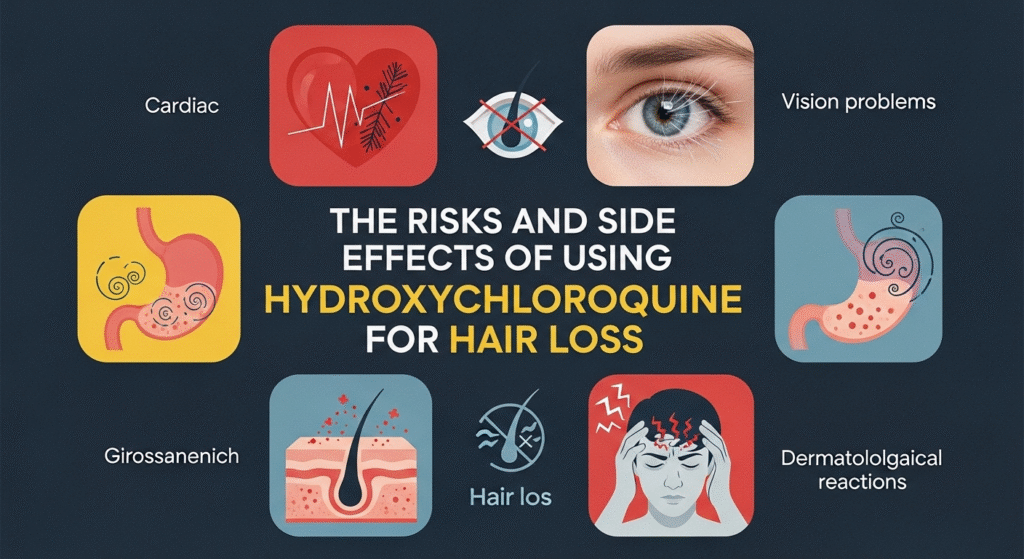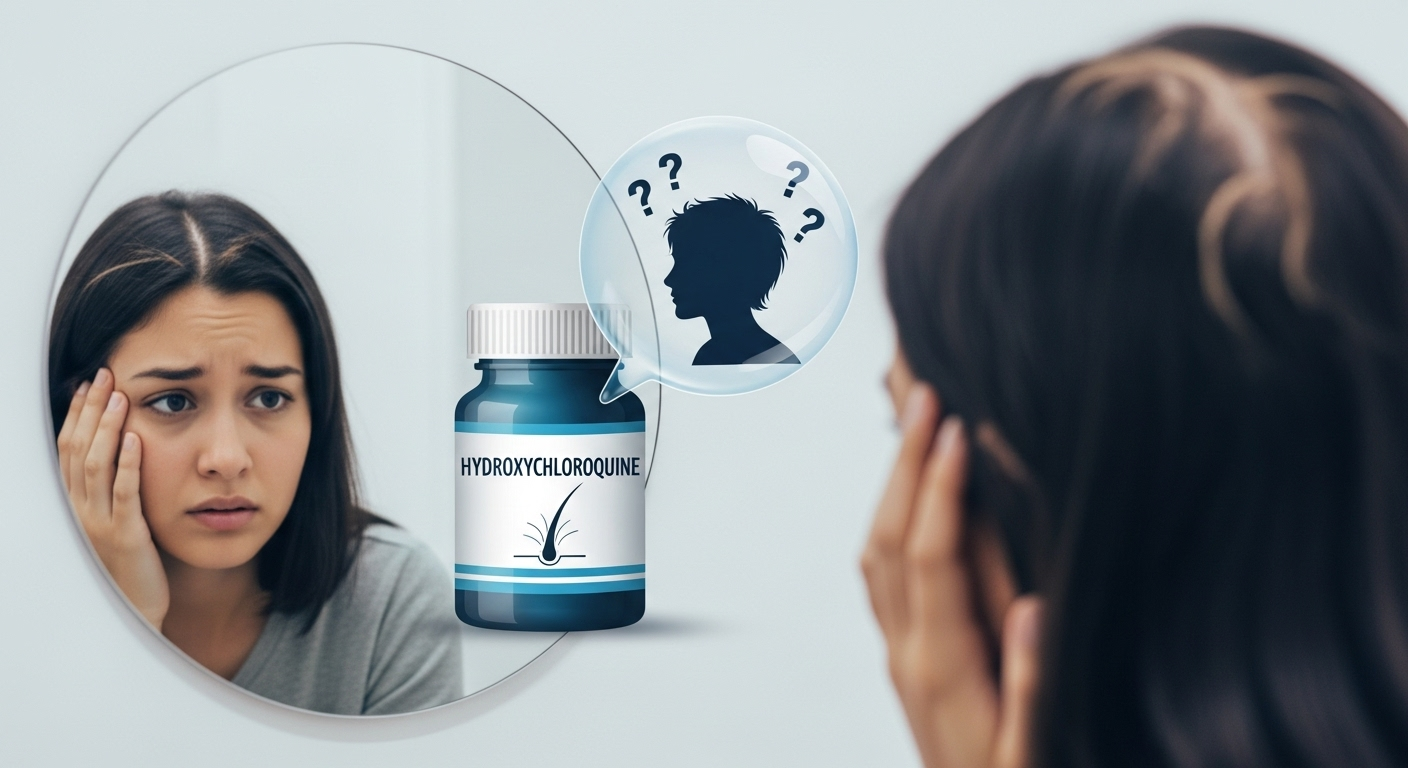Hair loss is a common concern that affects millions of people worldwide, leading them to search for effective solutions. One such solution that has gained attention is hydroxychloroquine, a medication primarily used to treat malaria and autoimmune diseases. Recent studies suggest that it may offer potential benefits for individuals experiencing hair loss, particularly those with …
Hair loss is a common concern that affects millions of people worldwide, leading them to search for effective solutions. One such solution that has gained attention is hydroxychloroquine, a medication primarily used to treat malaria and autoimmune diseases.
Recent studies suggest that it may offer potential benefits for individuals experiencing hair loss, particularly those with autoimmune-related conditions like alopecia areata. In this article, we’ll dive into how is Hydroxychloroquine for Hair Loss, its possible benefits, and the risks you should be aware of before considering this treatment.

What is Hydroxychloroquine and How Does It Work?
Hydroxychloroquine is a medication that has been used for decades to treat conditions like malaria, lupus, and rheumatoid arthritis. It works by modulating the immune system, helping to reduce inflammation and prevent the immune system from attacking healthy tissues. But what makes it relevant for hair loss? Let’s break it down:
Overview of Hydroxychloroquine’s Uses
Hydroxychloroquine was originally developed to treat malaria, but over time, it became widely prescribed for autoimmune diseases like lupus and rheumatoid arthritis. In these conditions, the immune system mistakenly attacks the body’s healthy tissues, leading to inflammation and pain. Hydroxychloroquine helps reduce this inflammation and suppresses the overactive immune response.
The Connection Between Hydroxychloroquine and Hair Loss
Recent research has explored hydroxychloroquine’s potential role in treating hair loss, especially alopecia areata, an autoimmune disorder that causes patchy hair loss. Because the condition is linked to inflammation in the hair follicles, hydroxychloroquine’s anti-inflammatory properties may help reduce immune attacks on the scalp, potentially leading to hair regrowth.
Potential Benefits of Hydroxychloroquine for Hair Loss

While hydroxychloroquine is not a conventional hair loss treatment, it has shown promising results for certain types of hair loss, particularly those linked to autoimmune disorders. Here’s how it may help:
Autoimmune-Related Hair Loss
Alopecia areata is a common autoimmune condition that leads to sudden, patchy hair loss. Because hydroxychloroquine can suppress the immune system’s attack on hair follicles, it may offer relief for those with this condition. Some studies have suggested that patients using hydroxychloroquine experienced significant regrowth of hair.
Impact on Other Forms of Hair Loss
Hydroxychloroquine’s role in treating androgenetic alopecia (common male and female pattern baldness) is less clear. There isn’t significant evidence to suggest it can reverse this type of hair loss, as it is not autoimmune-related. However, it may be explored as an adjunct treatment in cases where inflammation is contributing to hair thinning.
Managing Scalp Health
Hydroxychloroquine may also help maintain scalp health by reducing inflammation caused by underlying conditions. A healthier scalp can lead to better conditions for hair follicles to thrive, potentially preventing further hair loss.
The Risks and Side Effects of Using Hydroxychloroquine for Hair Loss

While hydroxychloroquine shows promise in managing hair loss in certain cases, it is not without its risks. Here’s what you need to know about the potential side effects and safety concerns:
Common Side Effects of Hydroxychloroquine
Like any medication, hydroxychloroquine comes with side effects. Common side effects include:
- Nausea and dizziness
- Headaches and stomach upset
- Skin rashes in some individuals
How Safe is Hydroxychloroquine for Long-Term Use?
Hydroxychloroquine is generally considered safe when used under the supervision of a doctor, but long-term use can come with risks. Prolonged use may lead to serious side effects, including:
- Retinopathy: Damage to the retina, which can lead to vision problems
- Liver damage: Especially when taken in high doses over long periods
- Cardiac issues: Rarely, hydroxychloroquine may cause heart problems, particularly in individuals with existing heart conditions
Who Should Avoid Hydroxychloroquine for Hair Loss?
Hydroxychloroquine is not suitable for everyone. Individuals with pre-existing conditions such as liver disease, heart disease, or retinal conditions should avoid using hydroxychloroquine unless directed by a physician. Always consult with a healthcare professional before starting this medication.
Expert Opinions: Is Hydroxychloroquine a Viable Option for Hair Loss?

As with any emerging treatment, it’s essential to consider expert opinions before using hydroxychloroquine for hair loss. Here’s what dermatologists and other medical professionals have to say:
Case Studies or Clinical Trials
Several small studies have explored hydroxychloroquine’s role in treating hair loss. One clinical trial found that patients with alopecia areata who were treated with hydroxychloroquine showed a significant reduction in inflammation and experienced some regrowth of hair. However, more large-scale trials are needed to confirm these findings.
Alternative Treatments for Hair Loss
While hydroxychloroquine may be useful for some types of hair loss, other treatments are more commonly recommended. These include:
- Minoxidil: A topical treatment for androgenetic alopecia.
- Finasteride: A medication that inhibits DHT, a hormone linked to male pattern baldness.
- Platelet-Rich Plasma (PRP) Therapy: A treatment that uses the patient’s own blood to promote hair growth.
How to Use Hydroxychloroquine for Hair Loss
If your doctor prescribes hydroxychloroquine for hair loss, it’s essential to follow their instructions carefully. Here’s what you should know:
Recommended Dosage and Administration
Hydroxychloroquine is typically taken in tablet form, with the dosage varying depending on the condition being treated. For hair loss, your doctor will determine the appropriate dosage based on your medical history and the severity of your hair loss. Do not self-medicate.
Monitoring Progress and Adjustments
When using hydroxychloroquine for hair loss, it’s essential to monitor your progress and report any side effects to your doctor. Your doctor may adjust the dosage or recommend stopping the medication if any adverse effects arise.
FAQs
Can hydroxychloroquine cure hair loss?
Hydroxychloroquine is not a cure for hair loss, but it can help manage autoimmune-related hair loss by reducing inflammation in the hair follicles.
How long does it take for hydroxychloroquine to show results for hair loss?
It may take 3-6 months of consistent use to see visible results, depending on the individual’s response to the medication.
Can hydroxychloroquine cause hair loss?
While rare, some individuals may experience hair thinning as a side effect of hydroxychloroquine. If this occurs, it’s essential to consult your doctor immediately.
Is hydroxychloroquine safe for long-term use to treat hair loss?
Hydroxychloroquine can be safe for long-term use when monitored by a healthcare provider. However, prolonged use increases the risk of side effects, such as retinopathy.
Can hydroxychloroquine be used alongside other hair loss treatments?
Yes, hydroxychloroquine can be used alongside other treatments, such as minoxidil or finasteride, for a more comprehensive approach to hair loss. Always consult your doctor before combining treatments.
Conclusion: Should You Consider Hydroxychloroquine for Hair Loss?
Hydroxychloroquine may be a helpful option for individuals suffering from autoimmune-related hair loss, such as alopecia areata. While it is not a cure-all, it can manage inflammation and help promote hair regrowth in some cases. However, it’s crucial to weigh the potential benefits against the risks, including long-term side effects. Always consult with a healthcare provider before starting hydroxychloroquine for hair loss to ensure it’s the right treatment for you.
Ready To Take Your Next step:
If you’re considering hydroxychloroquine for hair loss, it’s essential to consult with a specialist. Book a consultation with Dr. Uzma Irfan, an ISHRS-certified surgeon in Islamabad, to learn more about whether hydroxychloroquine is right for you and to explore other effective treatments.






